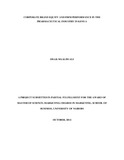| dc.description.abstract | The main purpose of the study was to establish the extent of corporate brand equity and firm
performance in the pharmaceutical industry in Kenya, and the factors influencing the corporate
brand equity. The study used a descriptive cross-sectional design. The target population was
consisting of all the 38 pharmaceutical manufacturing firms registered with Pharmacy and
Poisons Board as at 2014 (Appendix III). A census study was conducted since the population
was small. The study used both primary and secondary data. The primary data was collected
using a semi-structured questionnaire. From the semi-structured questionnaires both quantitative
and qualitative data were produced. The questionnaires were coded and edited for completeness
and consistency and entered into Statistical Package for Social Sciences (SPSS version 20).
Analysis involved descriptive statistics and inferential analysis. Descriptive analysis technique
gave simple summaries about the sample data in quantitative descriptions and included: mean,
standard deviation, frequencies and percentages. Pearson correlation analysis was conducted to
establish the corporate brand equity valuation conducted by pharmaceutical firms and their
effectiveness. The study findings were established as follows: the effects stakeholders’
consideration in the implementation strategies as they provided adequate information on the
matter; the respondents strongly agreed that corporate reputation, firms’ competition, firms,
value chain activity, and firms’ resource allocation influence the performance of the company;
the respondents were in a position to know of the effects stakeholders’ consideration in the
implementation strategies as they provided adequate information on the matter; the firm’s
corporate reputation used to communicate with stakeholders has a positive impact on the firm’s
brand image setting in terms of product differentiation; good brand management brings about
clear differentiation between products and it ensures consumer loyalty and preferences and may
lead to a greater market share; pharmaceutical companies have recognized the importance of
branding and have restructured their firms to include marketing and brand ambassadors and that
building brand equity is considered an important part of brand building. The study recommended
that the view that establishing and managing brand should not be taken to be the core operating
target for most industries but should also is seen as a source of competitiveness; the study
recommended that a brand should not just be an identifier but brand knowledge serves as a
protector for both the manufacturer and consumer and that as a source of brand equity,
pharmaceuticals could concentrate on a few brand associations, perhaps on one or two most
important ones. | en_US |

